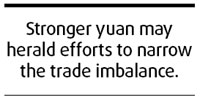Stronger renminbi
(China Daily)
Updated: 2008-04-11 07:36
Updated: 2008-04-11 07:36
The breaching of the 7-yuan mark to the US dollar is of symbolic importance, but not surprising. Policymakers still need to watch very carefully the impact of the strengthening of the Chinese currency on economic growth.
After a short pause early this week, the exchange rate of the yuan against the greenback yesterday continued its rise to surpass the 7:1 benchmark for the first time since China phased out its old exchange regime in July 2005. The yuan has gained about 18 percent in value since then.

This is an important moment because it has not only confirmed the recently quickened revaluation of the renminbi but also underscored the authorities' determination to fight soaring inflation with every measure possible.
The renminbi advanced 7 percent against the US dollar in 2007, twice as fast as in 2006. But in the first quarter of this year alone, the yuan has gained more than 4 percent against the greenback.
The ever-rising value of the yuan against the US dollar is a reflection of the world monetary markets. Many other major currencies have also gained considerably against the greenback this year as the US Federal Reserve reduced interest rates to prevent the world's largest economy from slipping into a recession.
Meanwhile, fast appreciation of the Chinese yuan may also be the beginning of the country's efforts to narrow its trade imbalance.
A ballooning trade surplus in recent years has added to tensions between China and some of its largest trading partners as well as difficulties for Chinese policymakers to rein in excess liquidity to cool economic growth. Now, the continuous strengthening of the yuan has begun to squeeze Chinese exporters hard enough to bring down growth of the trade surplus. China's net export plunged from $19.5 billion in January to only $8.6 billion in February. That marks a drastic slowdown given that the country's monthly trade surplus has stayed above $20 billion since last May.
If such a decrease in trade surplus is necessary for China to rebalance its economic growth, it will be no surprise to see the yuan on the up and the 7:1 threshold left behind. However, while allowing a stronger yuan to help tame domestic inflation by making imports cheaper, the Chinese authorities should also keep their eye on exporters struggling to remain competitive in overseas markets.
A too precipitous rise of the yuan could pose a grave challenge to the export sector that is under increasing pressure from surging costs for labor, energy and materials.
(China Daily 04/11/2008 page8)
|
|
|
|